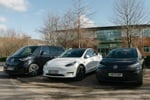By Professor Jim Saker
If you start an article by referring to Karl Marx, most readers will inevitably label you as a Left-wing academic and The Daily Mail will regard you as someone who has an in-depth hatred of Britain. The recent altercation between Ed Miliband and the Mail over his father’s views has brought the concept of Marxist ideology back into the news.
Ignoring the politics of the situation, I was left reflecting on the impact of Marx’s ideology today. Many things he said can be disputed, but part of his thesis was that society is shaped and determined by technology. Our industry supports his argument with the obvious impact that the car has had on society. The improved ease of mobility has shaped both work and living patterns. Towns have been configured around road systems and products are transported across countries with deliveries no longer constrained by the canal or rail system.
Technology and the customer
Over the past few years, one of the most interesting areas has been to look at how technology has impacted in the car dealership, especially at the interface with the customer.
 |
||
|
Professor Jim Saker is director of the Centre for Automotive Management at Loughborough University’s Business School. He has been involved in the automotive industry for more than 20 years. |
||
At Loughborough, we have conducted a number of studies looking at the role of technology in the sales process. When computers were first installed, the evidence showed that the use of IT enhanced customers’ overall perception of the sales process. The computer improved the presentation by the salesperson and actually gave credibility to the figures that were being quoted as part of the transaction. Research at that time showed that the only real weakness was in the salesperson’s ability to handle the technology. This was often caused by a lack of training.
Nowadays, with IT equipment being used widely in the sector, there is a level of assumed knowledge about its application. Tablets, phones and laptops are all part of the sales equipment you would expect to see in any dealership. The interface between the salesperson, the customer and the technology has become second-nature and the sales process has been adapted to accommodate this.
The article could end there, with the conclusion that Marx all those years ago was correct – technology does drive society, business and behaviour.
However, it was on a visit to Andre Roy, group managing director of Wearnes Automotive in Singapore, that I started to see how technology, or more correctly its connectivity, was transforming the approach to customer engagement.
Wearnes runs franchises in Singapore, Malaysia, Thailand, Indonesia, Hong Kong and China. The challenge for the company is how to ensure that the ‘Wearnes experience’ is delivered in each of these markets. As I walked around their new headquarters and training facility, I was drawn towards an illuminated map of South East Asia with all of the Wearnes dealerships located on it.
What puzzled me was a number of different coloured flashing lights against each dealership. I asked what these signified and was told that it was an indicator of customer satisfaction/dissatisfaction at each dealership at that precise moment. I suddenly realised that I was slightly out of my depth technologically.
Andre explained that customer feedback is undertaken electronically and that the results are automatically sent straight to his control board. The dealer knows what the customer reaction has been and knows that the group MD is aware of it as well. The fact that this happens in real time means the dealership has to address the concern immediately, as the flashing warning light stays on until the customer is satisfied that things have been dealt with.
Although the system is still being developed, it opened my eyes to the impact that technology can have on management. In this case, technology was allowing the management and monitoring of dealer sites thousands of miles away from head office in real time, which allowed action to be undertaken to address problems.
Karl Marx and George Orwell would probably have expressed reservations that ‘Big Brother’ was oppressing the proletariat etc., but I must admit that I was massively impressed with both the concept and its application.
As opposed to the usual way of getting customer feedback, with a delay in the response, this was immediate and allowed for problems to be solved there and then.
As I walked away from the screen, I noticed that a warning light was flashing over Malaysia and had been since my arrival. Obviously, there was a problem that was ongoing and was taking some time to resolve. I pointed this out but was told not to worry, the light bulb was faulty and wouldn’t switch off. If only all customer service problems were simply resolved by a malfunctioning light bulb.
Marx was probably right that society is shaped by technology, but only if it is working.















Keith Kingham - 28/11/2013 23:35
Great stuff, Jim......Question Everything ?